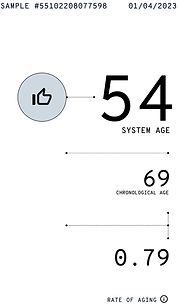
EPIGENOME TESTS
Scientists have discovered biomarkers of aging that are testable, non-invasive, and accurate to better understand the mechanisms of longevity and healthspan. The epigenome test uses DNA methylation as a novel biomarker of age, providing a information about how the body is functioning as a whole. DNA methylation is now widely considered a valuable biomarker of age. The following test results are an accurate representation of the effectiveness of the Extended Longevity Protocol in significantly reversing the Epigenomic Biomarker.

Epigenome Biomarker Results
DNA Methylation (Epigenetic Age)
What it is
-
An epigenome (DNA methylation) test measures chemical tags on your DNA that correlate with biological age.
-
It uses a blood sample to calculate an epigenetic age or “clock” you can track over time.
Why it matters
-
Epigenetic age predicts healthspan and mortality better than chronological age in many studies.
-
Changes after interventions (supplements, lifestyle, protocols) show whether aging is slowing or reversing at the molecular level.
How to use it
-
Take a baseline test, implement interventions, then retest at 6–12 months to measure change.
-
Use results alongside other biomarkers for a fuller picture.
Our Results
May 14, 2025 Test — 71 → 57. Showing14 years (age decelerated)
May 20, 2024 Test — 70 → 56. Showing14 years (age decelerated)


Jan, 2023 Test — 69.5 → 54. Showing15.5 years (age decelerated)



Customer Results Measured by Elysiumhealth
*On Extended Longevity Protocol for 6+ months*
Oct, 2022 test 73 → 61. Showing 12 years (age decelerated)



Second epigenome test for Dr. Roy Genatt, D.C.
58yo customer with baseline test age of 60
Using the Extended Longevity Protocol she has decelerated her age by more than12 years.
According to the Epigenome cytosine methylation test conducted by TruDiagnostic

First Epigenome Test.

Second Epigenome test after 6 months

Biological Age
If your chronological age tells you how many years you’ve been alive, your biological age tells you the age at which your body is functioning. Your biological age is dynamic: For every chronological year that passes, your biological age may accelerate or decelerate as reflected in your DNA methylation pattern. They demonstrate that you have aged faster or slower. Scientists estimate that biological age can be attributed to genetics, lifestyle and environmental factors. When we account for your DNA methylation-based biomarkers — also known as your epigenetics — we arrive at your biological age.

The Results
Below are six Epigenome tests taken betwee 3/14/2021 and 5/29/24 by Steven M. Schorr, CEO of Extended Longevity. During that period he decelerated his epigenomic age by 14-15 years and sustained that throughout.



The Tests
We use the ElysiumHealth.com/index test for our epigenomic assessments. We
believe this is the most accurate Epigenome test available for the general public.




